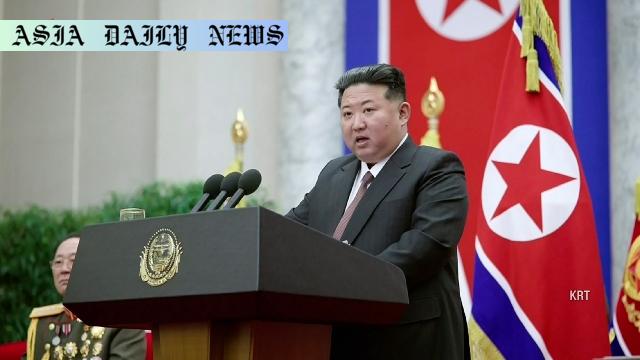Nuclear development program gains momentum in North Korea.
Kim Jong Un reiterated the acceleration of North Korea’s nuclear development program.
He criticized US, Japan, and South Korea’s military cooperation for creating regional imbalance.
Kim condemned multinational military exercises involving the United States.
Proposals to strengthen North Korea’s nuclear forces were introduced.

Kim Jong Un’s Vision for an Accelerated Nuclear Agenda
North Korea’s leader, Kim Jong Un, has doubled down on his commitment to enhancing the country’s nuclear development program. In a speech delivered to senior military officials on the 77th anniversary of the founding of the Korean People’s Army, Kim emphasized the need to strengthen deterrent capabilities at an expedited pace. This announcement came amidst growing military collaboration between the United States, Japan, and South Korea, which Kim described as a source of instability in the region.
A Critique of Military Alliances
Kim criticized joint military exercises involving the United States along with its allies Japan and South Korea. Such exercises, he argued, interfere with the power balance on the Korean Peninsula and throughout Northeast Asia. These alliances and their resulting activities have heightened tensions in a region already marked by complex geopolitical dynamics.
Plans to Enhance North Korea’s Defense Capabilities
The North Korean leader revealed a series of strategic initiatives aimed at amping up the nation’s nuclear deterrence capabilities. While no specific details of the plans were provided, his intent to accelerate nuclear development indicates a continued focus on nuclear armament as a cornerstone of national security. Kim’s remarks underscore his administration’s determination to enhance its military infrastructure amid mounting international pressure and sanctions.
Global Reactions and Policy Directions
Kim’s announcement arrives shortly after a reaffirmed commitment by US President Donald Trump and Japanese Prime Minister Ishiba Shigeru to work toward North Korea’s complete denuclearization. This juxtaposition of goals highlights the deep divide between Pyongyang and the broader international community. Such developments underscore the urgency for dialogue and diplomacy to mitigate the risk of escalation and to ensure peace and stability in the region.
The Implications of Accelerated Nuclear Development
North Korea’s push to advance its nuclear program has significant implications for global security. On one hand, it reflects the country’s resilience and determination in the face of mounting economic sanctions. On the other hand, it raises critical questions about the effectiveness of current negotiations and the adequacy of global frameworks in addressing nuclear proliferation. Regional players and the broader international community will increasingly find themselves at a crossroads as they navigate these challenges.
Conclusion
In summary, Kim Jong Un’s decision to intensify North Korea’s nuclear development accentuates the ongoing geopolitical tensions in Northeast Asia. With both domestic priorities and international provocations shaping this trajectory, the actions of all involved parties will play a critical role in determining the future course of the region’s security landscape. Efforts to foster constructive engagement will be crucial as the world seeks solutions to the complex interplay of militarization, diplomacy, and economic constraints shaping North Korea’s policies.



Commentary
Analyzing North Korea’s Nuclear Escalation
Kim Jong Un’s commitment to accelerating North Korea’s nuclear development continues to pose a substantial challenge for regional and global stability. This latest announcement reflects a long-standing pattern of defiance against international diplomatic efforts, underscoring the regime’s determination to bolster its deterrence capabilities.
The Role of Military Alliances
One cannot ignore the tensions exacerbated by military cooperation involving the United States, Japan, and South Korea. While these partnerships aim to promote stability and security in the region, they simultaneously feed into North Korea’s narrative of provocation and external threat. This dynamic creates a precarious cycle where every step toward collective defense by one side is met with escalated militarization by the other.
Global Implications and the Need for Dialogue
The implications of North Korea’s nuclear ambitions are far-reaching, with potential ripple effects on global non-proliferation efforts and regional power dynamics. A collaborative approach that prioritizes dialogue over antagonism remains essential. Policymakers must strike a delicate balance between deterrence and diplomacy, ensuring that the path to deescalation remains open.
Conclusion
Ultimately, North Korea’s persistent focus on nuclear development is a sobering reminder of the complexities of modern geopolitics. While condemning such actions is essential, fostering understanding and engagement may provide the most viable path forward. The international community must work collectively to navigate these challenges, striving for a solution that ensures peace, security, and stability for all involved.